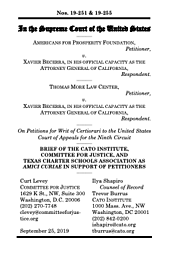Americans for Prosperity Foundation (AFP) and the Thomas More Law Center are charitable organizations who advocate for a variety of right-of-center viewpoints that are controversial in the current political climate. As charities, they fund their activities through private donations from like-minded individuals across the country, many of whom prefer to remain anonymous for fear of public reprisal. These fears are well founded; people associated with AFP and Thomas More have experienced threats, harassment, boycotts, and even violence because of the views they hold and their affiliations with the charities.
In 2010, the California attorney general’s office began demanding that all charities that fundraise in the state turn over their IRS Form 990 Schedule B. A “Schedule B” is a highly confidential IRS form that lists the names and addresses of a charity’s major donors—including those who live outside of California. Although the attorney general’s office claimed that it would keep Schedule Bs private, systematic incompetence and a lack of procedural and technical safeguards have led to repeated and widespread leaks of the documents to the public.
AFP and Thomas More each refused to give California their Schedule Bs and filed lawsuits to protect their donors’ anonymity. Both charities won at the trial court level, where a federal judge found that the disclosure requirement violated the donors’ First Amendment rights. The U.S. Court of Appeals for the Ninth Circuit reversed that judgment in both cases, however, and refused AFP and Thomas More’s requests for a rehearing. This prompted a sharp dissent from several judges, who argued that the court had made “crucial legal errors” by going against decades of Supreme Court precedent and refusing to apply what is known as “narrow tailoring.” “Narrow tailoring” is a common-sense requirement that the government carefully craft laws so that they infringe as little as possible on fundamental rights. The Ninth Circuit dispensed with this crucial requirement and applied a lower standard of protection.
AFP and Thomas More have each petitioned the Supreme Court to hear their cases. Joined by the Committee for Justice and Texas Charter Schools Association, Cato has filed a brief in support of these petitions. We argue that the Court should take this opportunity to clarify that narrow tailoring is always a requirement for laws infringing on First Amendment freedoms, including the freedom of association.
During the Civil Rights Era, the Court repeatedly used the narrow-tailoring requirement to prevent southern states from forcing the NAACP to disclose its membership lists. The Court recognized that privacy and anonymity in a person’s associations are of the utmost importance for individuals and groups with controversial viewpoints. Without these protections, the risk of social, economic, and physical consequences chills free association and expression.
Recently, donors and activists across the political spectrum have faced threats, harassment, boycotts, and violence because of their political views and activities. These range from the boycotts and public shaming of President Trump’s donors to the attempted bombing of billionaire George Soros for his donations to progressive causes. In this polarizing political environment, it is imperative that the First Amendment’s protections for anonymous expression and association be vigorously protected.
Instead, the Ninth Circuit mischaracterized the Supreme Court’s First Amendment jurisprudence to remove the narrow-tailoring requirement that protects the freedom to associate privately. We urge the Court to take up these cases and reaffirm its long-standing protections for First Amendment rights.




